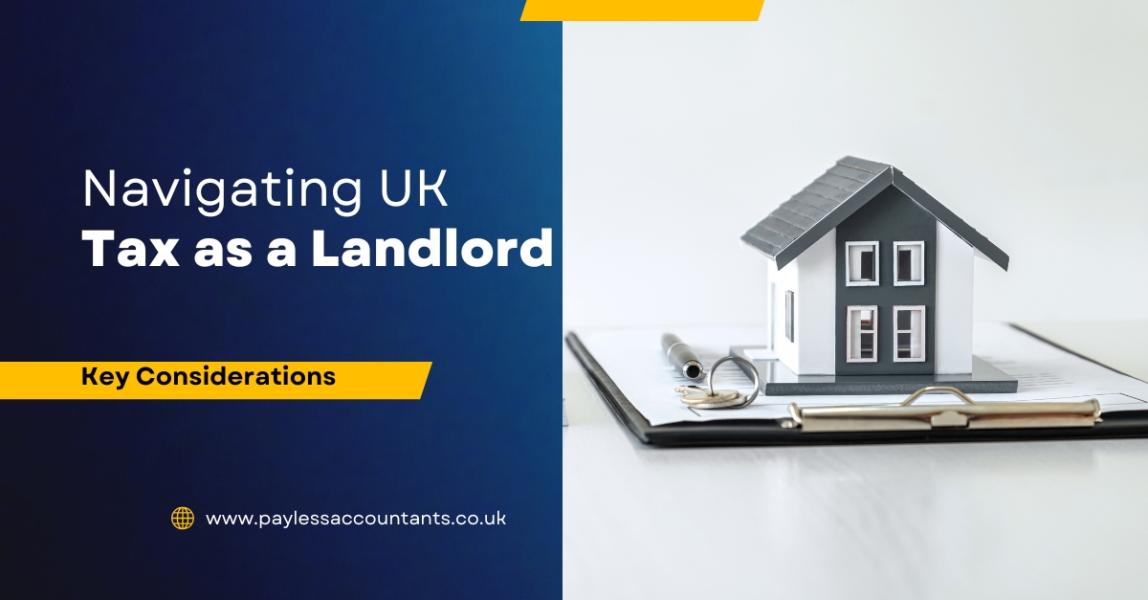Navigating UK Tax as a Landlord: Key Considerations
1. Declare Your Rental Income
If you rent out property in the UK, you’re required to declare your rental income to HMRC. This applies whether you own one buy-to-let or an entire portfolio.
-
Rental income includes: Rent received, utility payments, cleaning fees, and any other income from the property.
-
You must submit a Self Assessment tax return annually, even if your income is below the personal allowance threshold.
? Tip: Keep detailed records of all income and expenses from day one.
2. Understand Allowable Expenses
The good news? You can deduct certain costs before calculating how much tax you owe.
Allowable expenses include:
-
Mortgage interest (subject to tax relief rules)
-
Letting agent fees
-
Property maintenance and repairs (not improvements)
-
Council tax and utility bills (if you pay them)
-
Insurance (e.g. landlord insurance)
-
Accountant fees
However, be aware that capital expenses, like adding an extension or fitting a new kitchen, are not immediately deductible—they’re typically offset against Capital Gains Tax later.
3. Changes in Mortgage Interest Relief
The government phased out the ability to deduct mortgage interest from rental income. Now, you receive a 20% tax credit instead. This affects higher-rate taxpayers the most, as they can no longer claim relief at their marginal rate.
? Action Point: Consider how this impacts your tax bill, especially if you're a higher-rate taxpayer. Incorporating your property business might offer tax efficiencies, but it’s not for everyone—speak to us to weigh the pros and cons.
4. The £1,000 Property Allowance
HMRC offers a £1,000 property income allowance, which means you don’t need to report or pay tax on rental income under this threshold. But if you claim this allowance, you can’t also deduct allowable expenses—choose the most tax-efficient option for your situation.
5. Capital Gains Tax (CGT) on Property Sales
Selling a rental property? You may owe Capital Gains Tax if you’ve made a profit.
-
Basic rate taxpayers: 18% on gains
-
Higher/additional rate taxpayers: 28% on gains
You're entitled to a CGT annual allowance (currently £6,000 for 2024–25), which can reduce your liability. You must report and pay CGT within 60 days of completion.
6. Stamp Duty Land Tax (SDLT) Surcharge
When buying additional property, landlords must pay a 3% SDLT surcharge on top of standard rates. This can significantly affect your purchase costs—factor it into your investment decision.
7. Furnished vs. Unfurnished Lettings
Letting out a furnished property? You might be eligible for Replacement of Domestic Items Relief, which allows you to deduct the cost of replacing items like sofas, beds, and white goods.
? Note: This doesn’t apply to the original purchase of items—only replacements.
8. Non-UK Residents
If you live abroad but rent out UK property, you fall under the Non-Resident Landlord Scheme. Your letting agent or tenant may be required to deduct basic rate tax from your rent before passing it on to you, unless HMRC grants approval to receive rent gross.
9. Consider a Limited Company Structure
With rising tax burdens, some landlords are setting up limited companies to hold their properties.
Pros:
-
Corporation tax (currently 25%) is often lower than personal income tax
-
Full mortgage interest relief is still available
-
Greater flexibility in profit distribution
Cons:
-
More complex admin and costs
-
Potential CGT and SDLT if transferring existing properties
Speak to an accountant before deciding—what works for one investor may not suit another.
10. Get Expert Help Early
Tax laws change frequently, and landlord taxation is no exception. Whether you're a new landlord or managing a portfolio, Payless Accountant can help you navigate the complexities, reduce your tax bill, and stay compliant with HMRC.
Let’s Talk!
Confused about your landlord tax obligations? Let Payless Accountant guide you every step of the way. Contact us today for a free consultation and discover how much you could save with expert advice.
? Call us: +447488892229
? Email: hello@paylessaccountants.co.uk
? Website: https://www.paylessaccountants.co.uk/contact/

